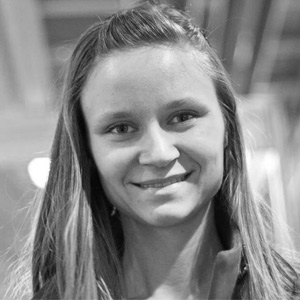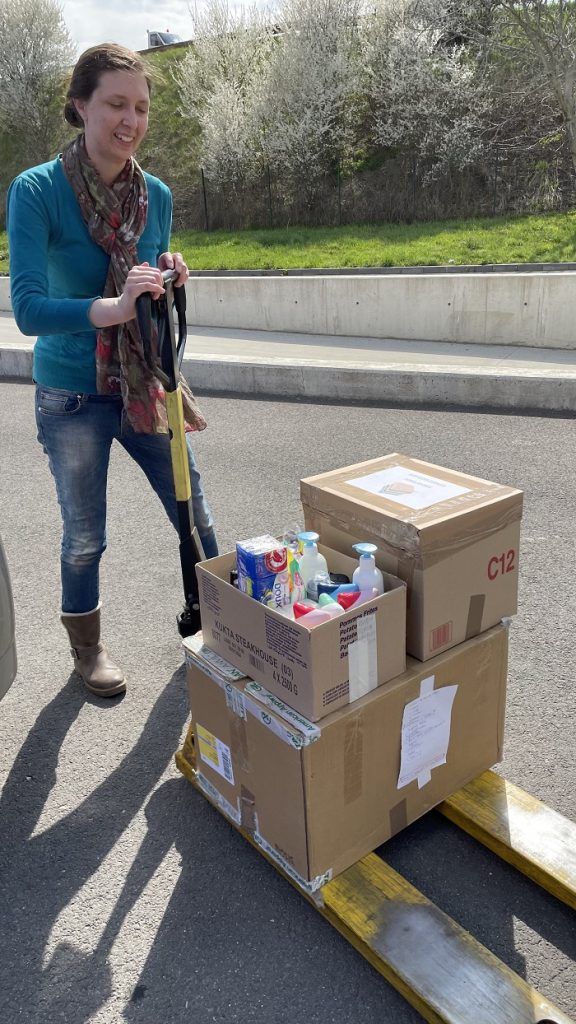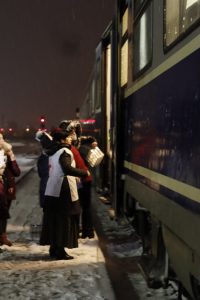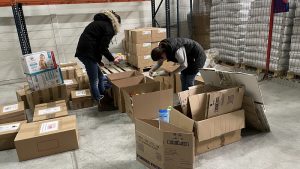Crisis in Ukraine: How one Romanian community foundation has responded
08 Jun 2022
In an email to the GFCF written on 11th March 2022, Emilia Ciurchea, Fundraising Manager at the Făgăraș County Community Foundation, which is located in central Romania and serves a predominantly rural area population of around 145,000, described the first two weeks of its response. Emilia’s description of both the chaos and uncertainty of those first two weeks – and the resolve demonstrated by the community foundation’s staff and board, and the local community itself, is published here.
Thursday 24th February 24th

Emilia Ciurchea, Fundraising Manager at the Făgăraș County Community Foundation
We had all heard the news of how the bombardment had started near Kyiv. I personally knew two Ukrainian women from a regional civil society programme we had participated in some years earlier. I immediately called and texted them to understand the situation from their perspective. Both of them told me that if I wanted to help, I should try and raise money, because many businesses had already started closing. Nataliya is the Director of an association that used to deal with domestic violence and I asked her to meet me and the foundation’s board members in the evening so that we could ask her more questions and see if, and how, we could help. Nataliya immediately helped us understand the severity of the situation: she was already thinking about organizing the association’s building into a shelter for internally displaced refugees fleeing from the east of Ukraine. At that moment, it seemed to be something that she should worry about in weeks, but in fact, it took only a few days until Nataliya’s shelter was filled with people. These people were and still are trying to find a safe and secure place until they can leave for other European countries, or until they decide on their next steps. We assured Nataliya that we would keep in touch and would try and help as much as we could.
Friday 25th February
All Romanian community foundations’ representatives and a representative of the Department for Emergency Situations (DES) met online and discussed very briefly about how we were seeing the situation at that time. Possible needs at the local and national levels, possible decisions to develop an emergency fund (local or national). Mainly, the representative for the DES told us over and over again how we should act in an organized and collaborative way. And how, even though we might all be very emotional, we should not lose our heads, but stay focused and wise in all actions and campaigns that we might want to organize. It seemed fair, but a little unrealistic about the emotional part – we were and still are very emotional. Perhaps due to the fact that we all have our emotional filters that make us act and react in certain ways.
Saturday 26th February
As a community foundation, we had no idea what the next steps should be, but we had only one thing in mind at that time: finding a way to show our solidarity! It took a few hours to find the right keywords, photos and wording to describe how we want to show our support. But we did it! We managed to show our solidarity publicly, which means through our social media channels (see Facebook page here). Our community reacted and showed its support and started asking what they could do to help. Having people ask what they could do to help is perhaps the peak of a community foundation’s work. That was when the real work started. We were then introduced to a group of NGOs all around the country, through DES. The objective: collaboration and mobilization of resources. Saturday was also the day when all Romanian borders with Ukraine started to be crowded and we realized it was just the beginning. On Saturday evening we started designing the Ukraine Emergency Fund (Fondul de urgență pentru Ucraina), so that it could be launched as soon as possible.
That Saturday, we also tried to reach people working for community foundations in Ukraine to find out how they were (especially if they were safe) and what their needs were at that moment.
Sunday 27th February

The foundation helped the local Red Cross Association to raise in-kind donations for the central refugee camp warehouse in Suceava.
Our board of directors approved the new fund that we were about to launch and we also invited the entire community to fill out a form that would help us centralize all resources at the local level, such as: accommodation capacity, food, medical, transportation, volunteers, interpreters of Ukrainian or Russian language etc.
Monday 28th February
We launched the Emergency Fund. Also, it was the first day when we helped the local Red Cross Association raise in-kind donations for the central refugee camp warehouse in Suceava – close to one of the main borders.
Monday 28th February through Friday 4th March
Volunteers from the community and donors raised in-kind and financial donations. 4th March was the day when we started realizing the severity of the situation: more and more refugees were arriving every day. Although the general message was that most Ukrainians are just transiting through the country and in fact, their final destination was another country, still, tens of thousands would stop in Romania, almost daily. At the national level, we did not yet have a clear picture of how many Ukrainians were planning to remain in our country, but the numbers are increasing every day. I welcomed the first family of refugees on 2nd March, they left for Azerbaijan; another person went to Madrid, and I am currently hosting a family of four, who might remain in Făgăraș. They have a seven year old child with autism and would love to find appropriate therapy for him, a good high school for their 14 year old son and of course, jobs for themselves as parents. That Friday we also decided to support Nataliya’s association near Ivano-Frankivsk (Ukraine) that had been quickly transformed into a shelter for internally displaced people. We were able to send €2,000 and Nataliya told us how she was now able to buy mattresses for the large number of people that were coming to the shelter every day.
Monday 7th March
We started to have discussions with various stakeholders in the local and regional community and discuss the next steps collaboratively. We had a discussion with representatives of all sectors working in Făgăraș country: civil society, schools / high schools, hospital, municipality, business sector, all local public institutions (such as: Police, Social Assistance, vulnerable groups etc.) and started working towards creating a fully formed collaborative plan among us all. We agreed to develop a formal committee whose objective is to deal with each domain referring to the refugees.
We also started talking about long-term inclusion plans for the refugees that will decide to choose this area as their final destination. We helped the first Ukrainian refugee to find a job here in Făgăraș, working in logistics at a big factory.
That day, we also started going to the train station each evening and waited for the train that was taking hundreds of refugees to the Romanian border (and beyond) so that we could provide them with refreshments and other basic supplies: milk, fruit, crackers, wet tissues etc. We planned on doing this as much as we could for as long was needed.
Our key takeaways from these first weeks of the Ukraine war crisis:
- Our community responds! Ever since we posted about our solidarity position, the community around our foundation has started growing organically day after day.
- There are many needs, some that can be anticipated, and some that change from day to day.
- Flexibility: the fundraising campaign for the Red Cross is one example. Another is the organizing at the train stations: the train stops for less than two minutes, and everything has to be very organized when it reaches the train station, but the community is amazingly responsive.
- We, as a community foundation should be very clear in our messages – our community needs us to say exactly what is needed, when and how much.
- Collaboration: it is the first time we are sitting at the same roundtable together with representatives from all institutions and departments in our community.
- We have to listen carefully: we know that the stories and the needs will continue to evolve. But communication is key!
- International diaspora from Făgăraș County are starting to be involved as well: we have had donations from diaspora and offers of accommodation in their country of residence.
What we foresee our main needs to be:
- We are trying to understand the needs of the entire community – and this includes people with disabilities, elderly, Roma ethnic minority etc. This is why we are working closely with associations that have vulnerable groups as their main focus. Our main focus is to make sure that every single person in our community receives the same access to support during this period – whether they are refugees or members of our local community. We will do our research and understand how we can help serve them all best.
- We are working with all the NGOs in our area to try and design ways that could support the development of their capacities. We are constantly in touch with them and asking about their needs – whether it is small funding, mentorship/know-how, volunteering etc.
- We are closely working with the local administrations in Făgăraș County while mapping the regional resources that could be accessed and used for a long period of time related to the refugee crisis: accommodation capacity, food preparation and storage capacity, education capacity, Romanian language learning, psychosocial support, counselling, social assistance, professional development and mapping of job opportunities in the area, availability of medical assistance etc.
Update
In an email sent on Friday 3rd June, Emilia shared the latest on the situation in Făgăraș:
“Right now, there are still around 100 people in Făgăraș and in the surrounding villages. We are in very close contact with the Social Assistance Department in Făgăraș and are constantly informed about the number of refugees coming in and leaving, and their needs (such as for language learning, professional integration, educational assistance and integration etc.). We then match the refugees’ specific needs with NGOs in Făgăraș that are able to work and assist directly. Some of them are working, some are starting to learn Romanian, some are being integrated in the schools here in Făgăraș. We are working closely with the NGOs that are designing integration plans for this summer. Of course, some (very few) are leaving to return home. We are working with a Ukrainian translator and are right now giving a grant to a Ukrainian Psychologist that will work with the refugee women in the area. After three months of being away from home, many are experiencing depression and severe anxiety. We are trying to find the resources for a Community Hub and Makerspace that these Ukrainian refugees can use for many purposes.”



